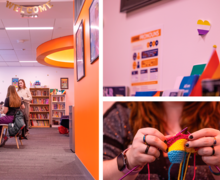Early College High School allows students to earn two years of college credit
Anna Leach | Contributing Photographer
Cletus Andoh, a freshman in the College of Engineering and Computer Science, attended an Early College High School in Brooklyn. While in high school, Andoh completed both high school and college courses and earned an associate degree.
When he graduated high school, Cletus Andoh had a full-time job at IBM waiting for him. If he accepted, he would make about $50,000 per year as an associate analyst. He was just 18 years old, barely an adult.
Instead, Andoh is now a freshman at Syracuse University. He refused a job at one largest tech companies in world to be a student, even though he didn’t have to in order to get a job.
“My parents really wanted me to go to college. So I thought I’d go and try,” Andoh said. “I thought I’d have more opportunities if I graduated college.”
Andoh has an associate degree, which he earned at an experimental high school in Brooklyn that allows students to complete two years of college coursework while also earning a high school diploma. In the last decade, the Early College High School model has become increasingly popular across the country as educators are finding new ways to prepare students — especially those who are struggling — to enter the job market.
With fewer high school graduates going to college, Early College High Schools provide an alternative to the traditional model where students have more success. A recent American Institutes for Research Study found that students who attend Early College High Schools enroll in college at a significantly higher rate than traditional high school students. Overall, the study found that students at Early College High Schools are more successful than traditional high school students.
Students in an Early College High School program, unlike in an AP or International Baccalaureate (IB) class, actually go to a college campus to take classes, said Josh Davis, communications manager for SU’s Project Advance. The logic goes that putting students in a college environment with increased academic rigor motivates students to do better and prepares them better for college, he said.
Not all Early College High Schools offer an associate degree program like Pathways in Technology Early College High School (P-Tech), where Andoh went. However, they aim to give students two years of college credit without having to pay tuition, according to Jobs for the Future, a nonprofit that works to create Early College High School programs.
The first Early College High Schools were established in 2002 as part of an initiative by the Bill & Melinda Gates Foundation, according to JFF. Since then, more than 250 Early College High Schools have been created across the country. More than 80,000 students, according to JFF, are enrolled in an Early College High School program this year.
Andoh said he took his first college class with a group of students from P-Tech the summer after his freshman year of high school at the New York City College of Technology. At the time, he said, he didn’t even know what a syllabus was and he expected the class to be “stupidly hard.”
“I thought that I wasn’t going to be able to do anything,” he added. “I had no faith that I could really pass this class.”
As the class continued throughout the summer, Andoh started to find the content less challenging. By the end of the course, he found the college class to be “fairly similar” to a high school class, he said.
Andoh said he took a combination of high school and college classes during his freshman, sophomore and junior years of high school. By the time he was a senior in high school, he was close to an associate degree and preferred taking college classes to high school ones, he said.
The idea behind Early College High Schools is that the traditional high school to college model is neither feasible nor successful for every high school student.
In 2014, 68.4 percent of high school graduates were enrolled in a college or university, according to a recent Bureau of Labor Statistics study. That is the lowest it has been in the past decade, according to The New York Times.
President Barack Obama supported the idea of Early College High Schools in his 2013 State of the Union Address, where he mentioned P-Tech.
“Right now, countries like Germany focus on graduating their high school students with the equivalent of a technical degree from one of our community colleges. Now at schools like P-Tech in Brooklyn … students will graduate with a high school diploma and an associate’s degree in computers or engineering. We need to give every American student opportunities like this,” he said in his speech.
Andoh said his experience at an Early College High School made adjusting from high school to college easier. He said he came in knowing what to expect and how to succeed in a college environment.
“I really liked my experience. It was different, but looking back going to another high school isn’t appealing for me,” Andoh said. “I came in ahead and P-Tech really helped with that.”
Published on November 17, 2015 at 10:34 pm
Contact Rachel: rsandler@syr.edu





